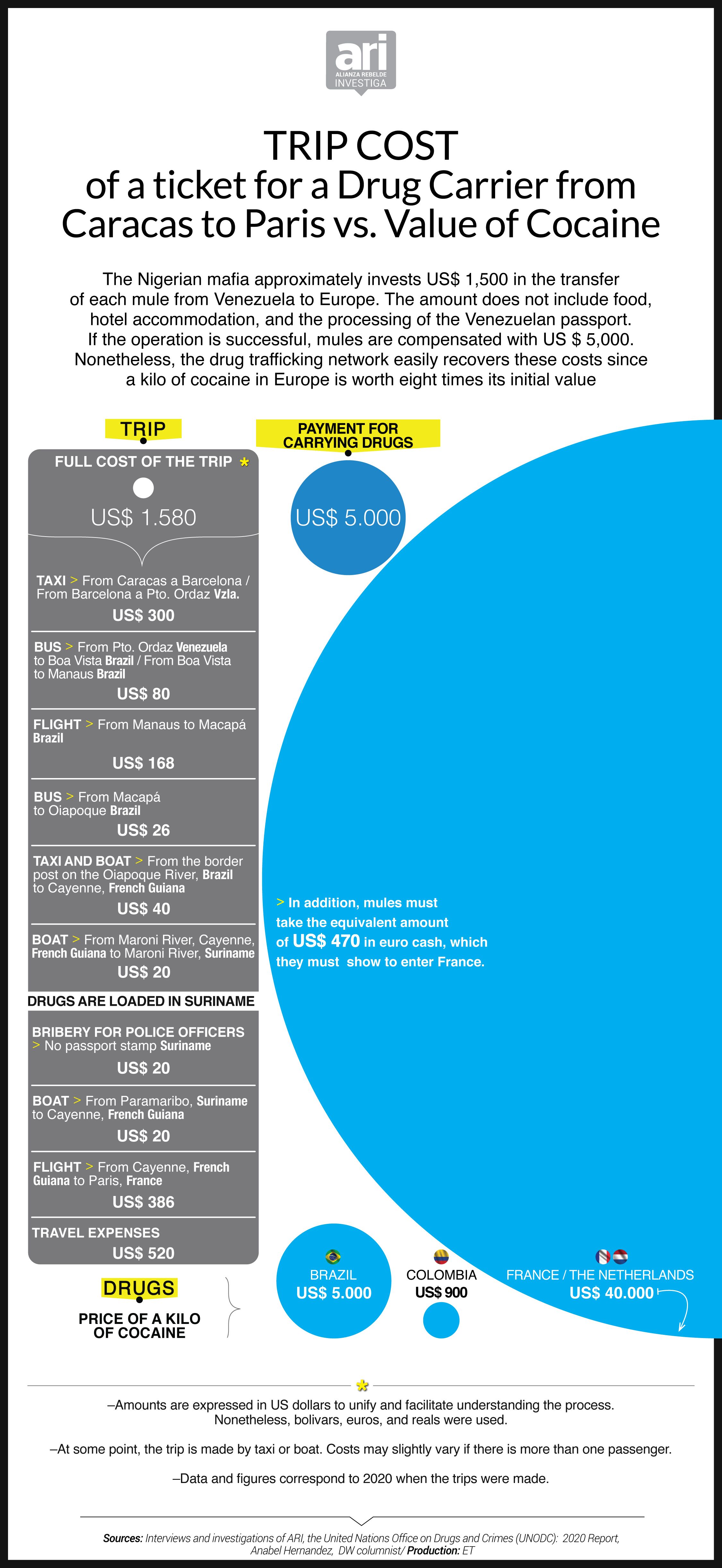THE NIGERIAN MAFIA REACHES VENEZUELA
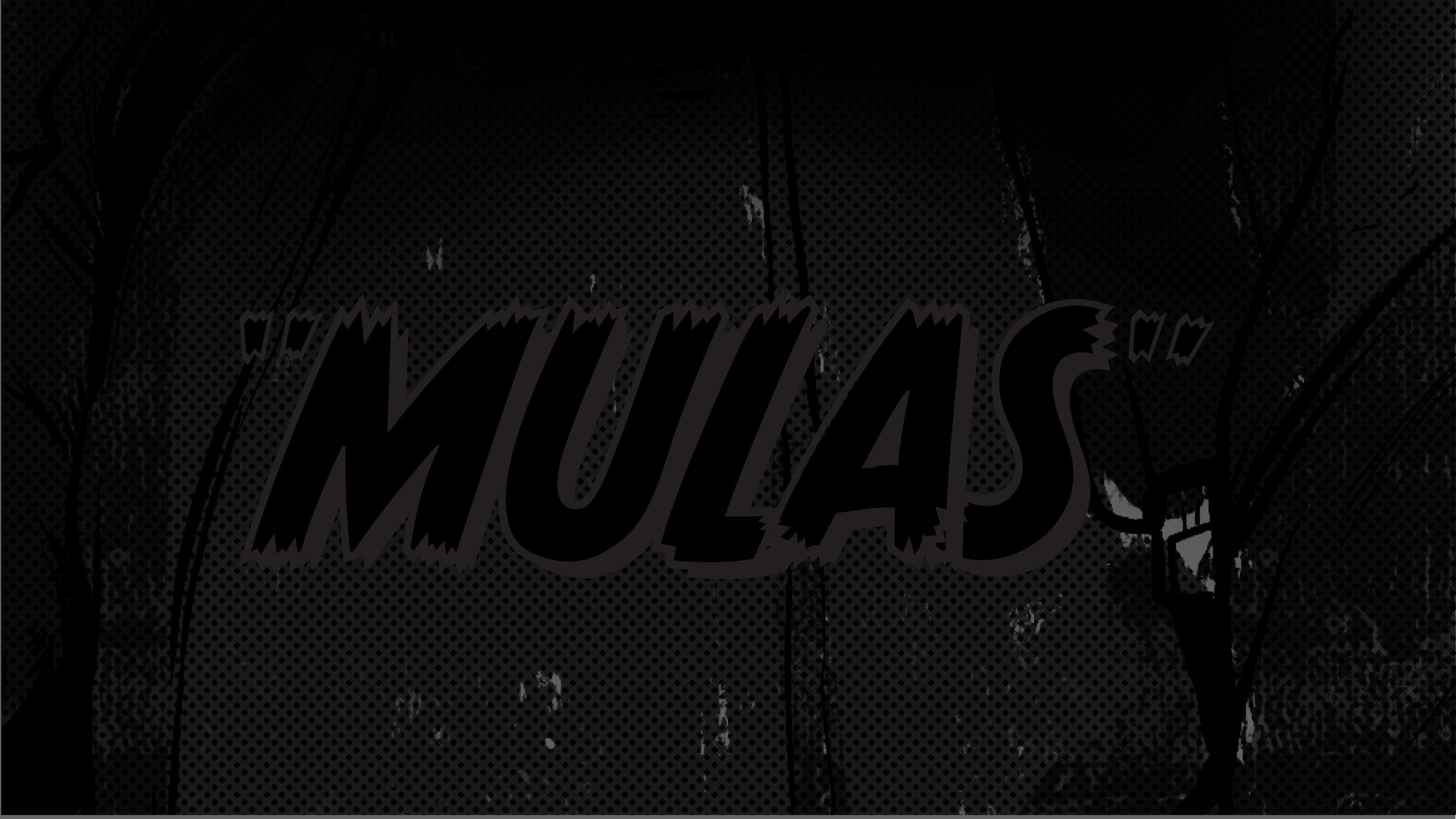
The Nigerian mafia is the most powerful African criminal organization that operates outside the continent. It has established and expanded in Europe and South America. Brazil, French Guiana, and Suriname serve as its operational hubs in the region
Through this investigation, two leaders of the Nigerian criminal networks established in Brazil were identified. No ties between these churches and criminal acts were identified
According to one of the interviewed pastors, their activities in Venezuela are completely religious. “Everything we do is related to God,” he stated
The main hall of the Nigerian evangelical church located in Avenida Lecuna in Caracas was still crowded. The religious service had ended, but the pastor’s assistants were still distributing food to the attendees, mostly Venezuelans. It was any given Sunday of the week of flexibility during the quarantine for COVID-19.
“Who wants to eat?,” a man of average height asked as he brought a plate of rice and chicken. Since the visitor was quite surprised, this man explained in very basic Spanish, “In my country, we customarily offer food to everyone.” Women, children, and older adults ate eagerly as they talked seated on the same place where they had listened before to the Christian preaching.
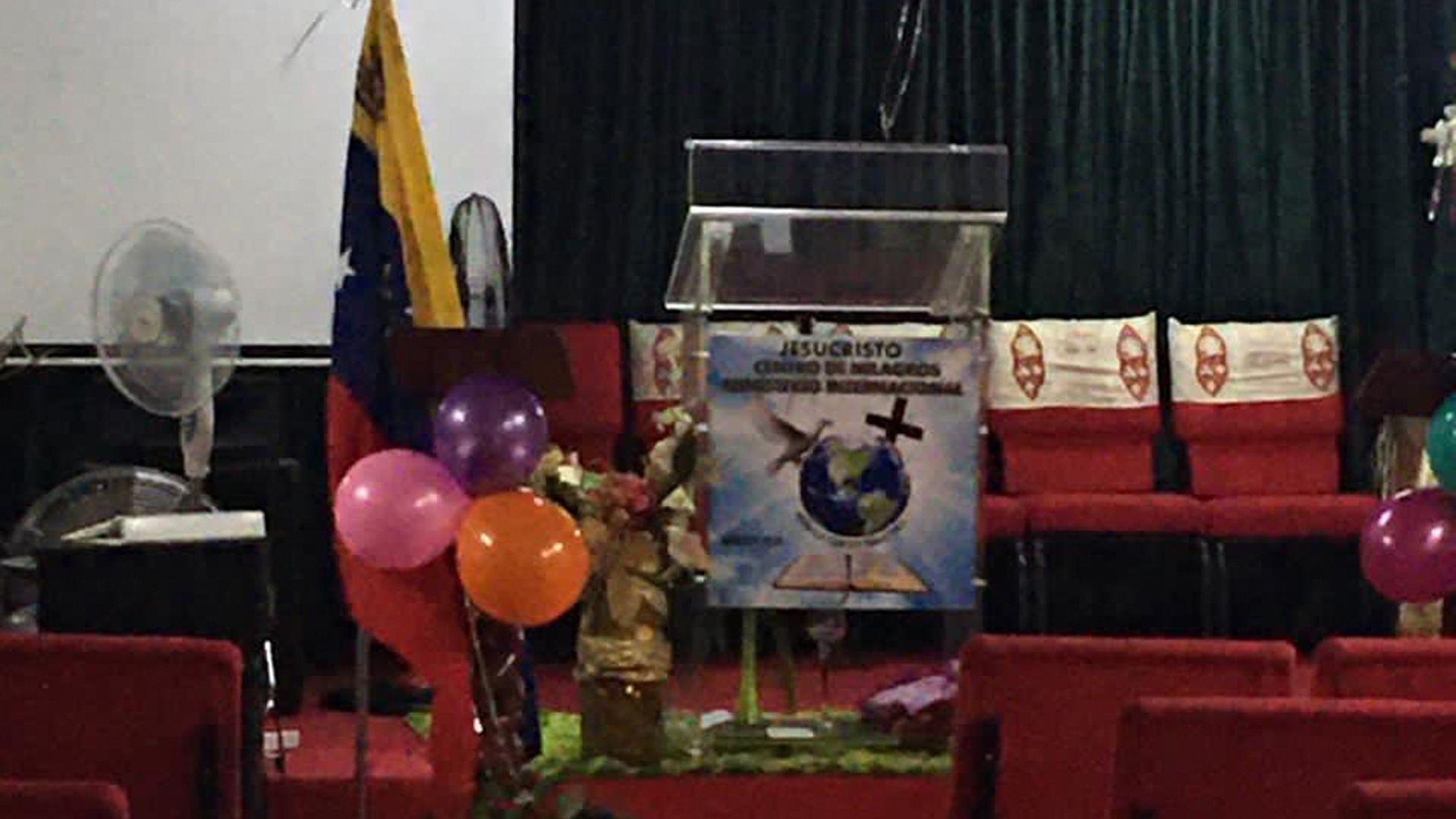
In the improvised church upstairs, in a smaller area, Pastor Joshua Aminchi Jock shared his table with a Nigerian community of migrants and their relatives. There were about fifteen people. They were also having rice and chicken but talked in English instead. No Venezuelans were there.
One of the pastor’s assistants suggested to come back at another time since the religious leader had several meetings that day.
Even though the ARI team visited this place three times before, this was the only time they were able to enter the church known as ”Jesucristo Centro de Milagros Ministerio Internacional.” The business hours of the church had changed because of COVID-19. During their first attempts, the place was closed. The building entrance is protected by a gate, and nobody listened to the knocks on the door.
The neighbors stated that the pastor lived there. They described him as kind and helpful. Even though they thought he was Trinitarian for his accent, they were surprised when they learned he was actually Nigerian.
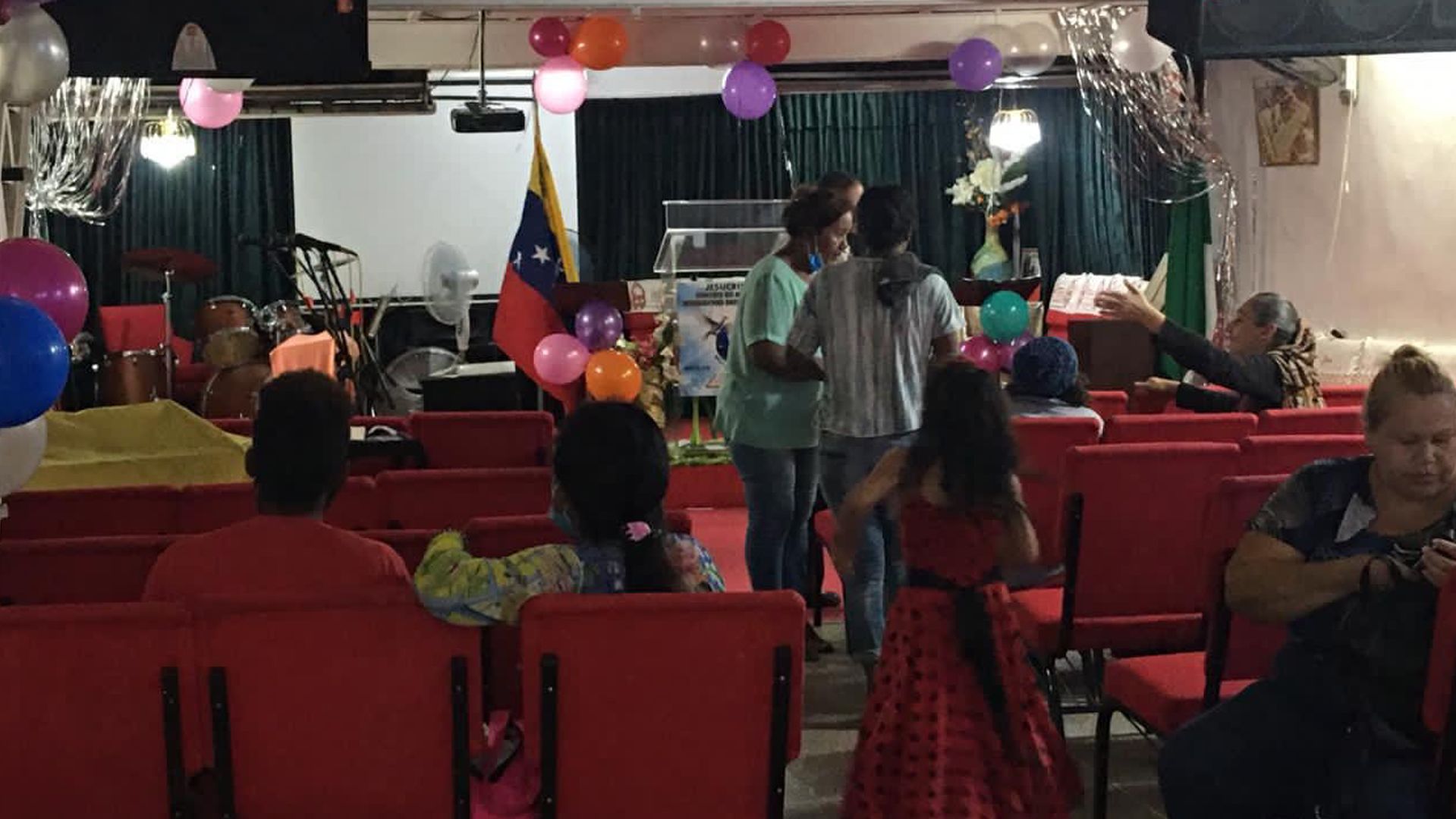
Given that meals are usually served afterwards, church attendees stay after the religious service ends | ARI
Given that meals are usually served afterwards, church attendees stay after the religious service ends | ARI
A young man who left the church to buy safe drinking water said that he had only been in Venezuela for a couple of months and had arrived before the confinement began due to the pandemic. He also confirmed that this was the pastor’s residence and that the clergyman was not there at the time.
That same Saturday, a woman who wore a military uniform and was driving a red Arauca parked the car in front the church. She pulled out several bags with chickens and groceries, stored them in the church, and stayed inside for more than half an hour.
On another occasion, some of the church attendees explained that religious services are on Sundays from 9:00 AM to 11:00 AM. On Tuesdays, there is only service for women, and on Wednesdays there is another open gathering in the afternoon. They made it clear that they attended the service for the meals served afterwards. They were modest Venezuelans, Nigerians, and probably of a different nationality speaking.
The gate of the church has an image that looks like Jesus Christ and religious messages on it. It remains closed when there is no service. This is why is hard to tell that behind it there is a church working in the heart of Caracas.
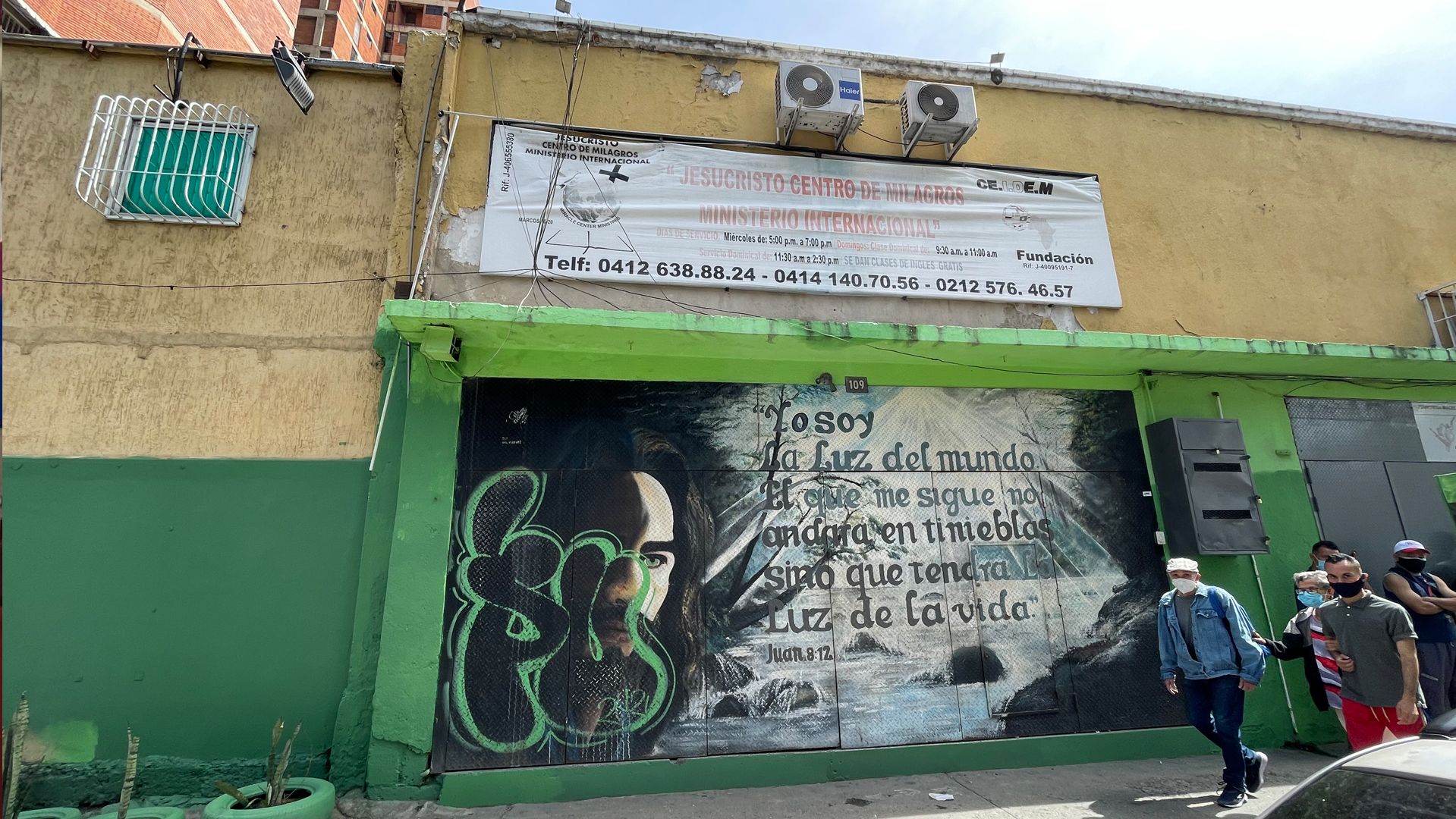
The church “Jesucristo Centro de Milagros Ministerio Internacional” is in Avenida Lecuna in Caracas | ARI
The church “Jesucristo Centro de Milagros Ministerio Internacional” is in Avenida Lecuna in Caracas | ARI
“EVERYTHING WE DO IS RELATED TO GOD”
With the help of a church member who had better command of Spanish, Pastor Joshua Aminchi accepted to answer ARI’s questions by phone. Once he learned the purpose of our query and found out that the investigation was about a Nigerian drug trafficking network that recruited Venezuelans, he stated, “We know nothing. We are devoted to our religion. We only help people.”
The pastor’s assistant claimed to be Venezuelan, but his accent indicated something else. He stated that many Nigerians who stop by Venezuela have other countries as final destination. “Not everyone who comes here belongs to our church, not all who live in Caracas are related to it,” this man affirmed regarding the church “Jesucristo Centro de Milagros Ministerio Internacional.” He also mentioned that there are other Nigerian churches in the Venezuelan capital.
Before Joshua Aminchi Jock handed over the phone to his assistant, he said, “Do you know who am I? I am the pastor of the Presidential Honor Guard.” His assistant added that he has ties with the Bolivarian National Armed Forces (FANB by its Spanish acronym). “I am musician of the orchestra of the Command of the National Guard (GNB by its Spanish acronym),” he specified.
Then, Joshua Aminchi Jock’s assistant ,who was next to him and under his instructions, explained that the church’s activities were completely religious. “Everything we do is related to God,” he added before the brief conversation ended.
Even though it is not the case of the church “Jesucristo Centro de Milagros Ministerio Internacional,” the researcher and professor at the university Sciences Po, Corentin Cohen has identified ties between some Nigerian churches and illegal activities.
“I have seen many cases where Nigerian pastors are involved in trafficking or have helped to identify mules in Brazil. Churches provide structure to Nigerian communities. The richest individuals of the community are usually at the very top of the hierarchy, and so on. The most vulnerable are there, too. It is the right place for recruitment or transiting,” Cohen stated during an interview with ARI.
Cohen, an expert and researcher of African cultures, remembered a case in France in which the clergyman was the head of a prostitution ring and a human trafficking network while he was simultaneously member of a Nigerian brotherhood. “This is business. It may be a cover or just a way of making money every now and then,” he added.
Nonetheless, Cohen stated that this is by no means a systematic and generalized practice. Otherwise, all Nigerian churches would be linked to illegal activities.
Cohen explained that churches often have self-proclaimed pastors. “Experiences are sometimes different, but these are mostly local ad hoc structures, garage churches. They work as franchises. At first, they must give back part of their benefits to Nigeria. You would need to check if a legal entity is behind just like in the United States and Europe. Probably, there is a record of the donations received and expenses,” he stated.
A MAN SAT IN A CHAIR STARED FROM THE SIDEWALK
In the same block where the church is, less than 50 meters away, two men seated in different chairs stared from the sidewalk. They were doing nothing. They just stared waiting for something to happen. Apart from this strange scene, one of the men was bigger, sturdier, and with darker skin than the average Venezuelan.
When this man was approached, he replied with short, comprehensible words in Spanish that they were Nigerians. He explained that they did not belong to the evangelical church across the street. He mentioned that they had been living in Venezuela for some time now in the area near to Nuevo Circo in Caracas. He also mentioned that he knew the pastor.
This man insisted that he did not attend this church. He clarified that there are different Christian religions and churches in Nigeria. He even commented that several Christian organizations used to gather in La Candelaria, Petare, and Centro Comercial Chacaito. According to him, this was the main meeting point of the Nigerian community before the pandemic, where between 300 to 400 people got together.
A child came by and interrupted the conversation. He gave the sturdy man a one-dollar bill. “My father sent you this for what you exchanged him,” the little one said. The man gestured a thumbs up and kept doing what he was doing (sigue en lo suyo), that is, seating on his chair in the middle of the sidewalk just looking and waiting. This is how you find him every single day.
It remains unclear whether this man is a formal money changer or does something else that requires him to stay at the same point just staring.
This scene reminded us of one of the Nigerians identified in Brazil as leader of the network that recruits drug mules who had been previously arrested for a crime related to foreign exchange. This man is Kevin Muroof Ezequiel Salami, owner of Acceso Rapido Hotel and the lead pastor the Redeemed Christian Church of God in Boa Vista.
THE NEW "NIGERIAN mafia" EXPANDS ACROSS THE WORLD
Nigeria is the most populated country in Africa with over 180 million inhabitants. More than fifty organized criminal groups operate there. They are called secret societies, confraternities, or brotherhoods. Some of them emerged as activist groups against racism in universities. Nowadays, they are gangs dedicated to human trafficking, drug trafficking, arms trafficking, among other crimes. They are often led by high-class individuals, politicians, and important businessmen of this African country.
Nigerian secret societies have expanded throughout Western Europe and several South American countries. According to a report published in 2019 by DW, “In Sicily, rumor has it that there is a new Nigerian mafia. Italian mafia differs from the Nigerian because both the perpetrators and their victims are from abroad and live outside mainstream society.”
According to an Italian official cited in this report, “The New Nigerian Nafia is not a unit but a group of secret societies and criminal gangs, as they call themselves, like Black Axe, Vikings, and Supreme Eiye Cofraternity,. Other researches consider that Nigerian organizations work more like extended family systems, which makes it harder to identify them.
The French investigator Corentin Cohen, professor at the university Sciences PO in Paris and expert in African studies, confers significant influence to these criminal structures. “Nigerians are quite an influential criminal group. They are less popular than the Italian or the Colombian mafias but have great influence at an international level. They are present in countries such as Afghanistan, Italy, and Brazil. Recently, we have witnessed an increase of detentions of Nigerians who live in Brazil. The long-term relationships between criminal groups in Suriname and Brazil like the First Command of the Capital (PCC by its Portuguese acronym) and Red Command are well-known. Nigerians have a fine international network. They have good relations with the Italian mafia Ndrangheta,” he explained during an interview with ARI.
According to a 2013 report of AMERIPOL called Situational Analysis of Drug Trafficking -A Police Perspective, which follows the same lines, African groups have gained ground in the cocaine trafficking to Europe, a market that has been historically controlled by Colombian organizations. “Since 2005, several criminal groups from West Africa, often led by Nigerians, have strongly established in the cocaine market of many countries from Western Europe. Some Nigerian groups have also started to export cocaine from Brazil, especially from Sao Paulo to different destinations in Africa and Europe. Most of these groups lack hierarchical organizations. They operate as independent units within the framework of autonomous networks,” the report specified.
By 2002, the Red de Seguridad y Defensa de América Latina already warned about the scope of Nigerian criminal groups. According to this organization, “Nigeria, the most populated African country, is the main hub for drug trafficking in the continent and an important spot for drug trade worldwide. Nigerian criminal networks take Asian heroin to the United States and South American cocaine to Europe, Asia, and Africa.”
Traditionally, Nigerian drug trafficking networks used people to transport drug seizure hidden in their clothing or inside their bodies. Even though they have improved their shipment methods, the use of drug mules is still a common practice.
According to a 2019 report of the Latin American Faculty of Social Sciences (FLACSO by its Spanish acronym) published in the Latin American Journal of Security Studies (URVIO by its Spanish acronym), “Nigerian groups control 30% of the cocaine exported from Brazil by sea. Nearly 90% of the mules or human courier who transports cocaine from Brazil to Africa in commercial flights are sent by Nigerian groups established in Sao Paulo, the city with the highest Nigerian population in Latin America.”
Apart from Brazil, this report specifies that other Latin American like Venezuela, Colombia, Ecuador, and Peru are part of the drug trafficking route to West Africa.
According to FLACSO’s document, “Nigerian criminal networks are the most important when it comes to cocaine trafficking from Gulf of Guinea to Europe. They manage countries in Sub-Saharan Africa as subsidiary markets. This way, Nigerians are fully involved in the supply chain, both in the producer and transit countries, where San Pablo is considered a main hub in Latin America just as in the consumer ones (primarily, Great Britain, Spain, Italy, and Germany).”
- Venezuelans, mostly women, who work
for the Nigerian mafia. - They are in Venezuela.
- They attract and recruit potential mules
to transport drug. They organize
the journey up to the state of Roraima in Brazil.
- Nigerians. They are between three and
five individuals. - They are in Brazil and Suriname.
- Recipients and trainers receive drug carriers
from Venezuela or recruit Venezuelan migrants
and refugees. They accommodate recruits
in short-stay hotels for migrants. They prepare
the trip to Europe for them. They provide
food to carriers to enlarge their stomachs.
They indicate the route to follow until recruits
take the flight to Europe. They provide
the airline tickets and money, too.
- From Boa Vista, they monitor the complete
journey of mules. They keep in touch
by phone permanently. - They are managers or owners of short-stay
accommodations for migrants and refugees
in Boa Vista and other Brazilian cities.
They may also be pastors of any Nigerian
Christian church. - Some of the organization’s leaders are
in this group.
- Venezuelans. They are between three
and five individuals. - They are in Brazil and Suriname.
- They provide the finger cots containing drugs
that will be ingested by the carrier. They teach
mules how to swallow them and give them
the final instructions for the journey to go
smooth. - Most are Venezuelans. For unknown reasons,
they stay working for the Nigerian organization
after serving as mules.
- Nigerians. The number remains unknown.
- They are in Amsterdam, the Netherlands.
- They get a bag with the finger cots containing
drugs and pay mules for their work. In addition,
they give mules US dollar cash to take
it to Brazil, which evidences that small
and clandestine foreign exchange transactions
are another activity of this mafia.
- Nigerians.
- They are in Africa and Europe.
- They run the operation of drug trafficking.
They engage in human trafficking.
They control informal exchange offices.
They run Christian churches in different
countries.
- Venezuelans, mostly women, who work for the Nigerian mafia.
- They are in Venezuela.
- They attract and recruit potential mules to transport drug. They organize the journey up to the state of Roraima in Brazil.
- Nigerians. They are between three and five individuals.
- They are in Brazil and Suriname.
- Recipients and trainers receive drug carriers from Venezuela or recruit Venezuelan migrants and refugees. They accommodate recruits in short-stay hotels for migrants. They prepare the trip to Europe for them. They provide food to carriers to enlarge their stomachs. They indicate the route to follow until recruits take the flight to Europe. They provide the airline tickets and money, too.
- From Boa Vista, they monitor the complete journey of mules. They keep in touch by phone permanently.
- They are managers or owners of short-stay accommodations for migrants and refugees in Boa Vista and other Brazilian cities. They may also be pastors of any Nigerian Christian church.
- Some of the organization’s leaders are in this group.
- Venezuelans. They are between three and five individuals.
- They are in Brazil and Suriname.
- They provide the finger cots containing drugs that will be ingested by the carrier. They teach mules how to swallow them and give them the final instructions for the journey to go smooth.
- Most are Venezuelans. For unknown reasons, they stay working for the Nigerian organization after serving as mules.
- Nigerians. The number remains unknown.
- They are in Amsterdam, the Netherlands.
- They get a bag with the finger cots containing drugs and pay mules for their work. In addition, they give mules US dollar cash to take it to Brazil, which evidences that small and clandestine foreign exchange transactions are another activity of this mafia.
- Nigerians.
- They are in Africa and Europe.
- They run the operation of drug trafficking. They engage in human trafficking. They control informal exchange offices. They run Christian churches in different countries.
THE BUSINESS OF TRAFFICKING DRUGS THROUGH A DRIP SYSTEM
Nigerians have a vast experience in the use of drug mules. According to AMERIPOL’s research, the profile of the human courier used for the African route by air is “Male, Nigerian, average age of 33 years (age range between 24 and 41 years) and traveling in flights from Senegal. In every case of Nigerian courier, the substance was transported already ingested.”
Even though major Mexican cartels and Colombian organizations have replaced mules with narco submarines, shipment in containers, and private jets, the use of drug carriers or human courier still prevails as it is shown in the popular series Airport Security of National Geographic.
According to AMERIPOL’s prediction, “The use of human courier or mules will continue to rise through flights from South America and countries of the African coast. The benefits generated for the cocaine introduced into Europe through this drip system are quite significant for the criminal organizations and common criminals.”
According to a joint research of Insight Crime and Global Initiative published in March 2021, a kilo of cocaine in Colombia, a country that currently has a record production of this drug, costs approximately US$ 900. When the product reaches Brazil, its price increases to US$ 5.000, but in Europe it multiplies by eight and may be over US$ 40,000.
As it is explained in AMERIPOL’s document, extremely pure quantities are adulterated or cut to double or triple their original weight, based on the level of adulteration.” Several dosages are obtained from a kilogram of cocaine (Half is carried within the body).
Under this framework, the drug carrier ingests the finger cots containing cocaine expecting to get from US$ 4,000 and US$ 5,000 for trip. Nevertheless, there is no payment guarantee. Those who survive the journey are detained or remain working as slaves for the criminal networks that recruited them.
David Weinberg, French sociologist and investigator specialized in the illicit supply of drugs, explained that criminal organizations traditionally use the diaspora from international trafficking. “Venezuela’s financial, political, and health situation forces people to leave. This creates a reserve army for criminal groups. Fleeing Venezuela is the main reason underprivileged people accept to be drug mules. This might just be simply a hypothesis,” he claimed.
The vulnerable condition of the individuals recruited to transport drugs does not diminishes or overrules the criminal nature of their actions. “Despite having elements of human trafficking, this cannot be considered as such because it is classified as a crime, that is, the illicit supply of drugs,” Norma Ferrer, lawyer, investigator, and human rights activist pointed out.
Ferrer considers that this crime may fall into the concept of modern slavery.
Unfortunately, many Venezuelans who are hit by the humanitarian crisis and hyperinflation have the ideal profile to fall into drug trafficking networks that will turn them into mules, the dehumanizing term used to identify drug carriers.
